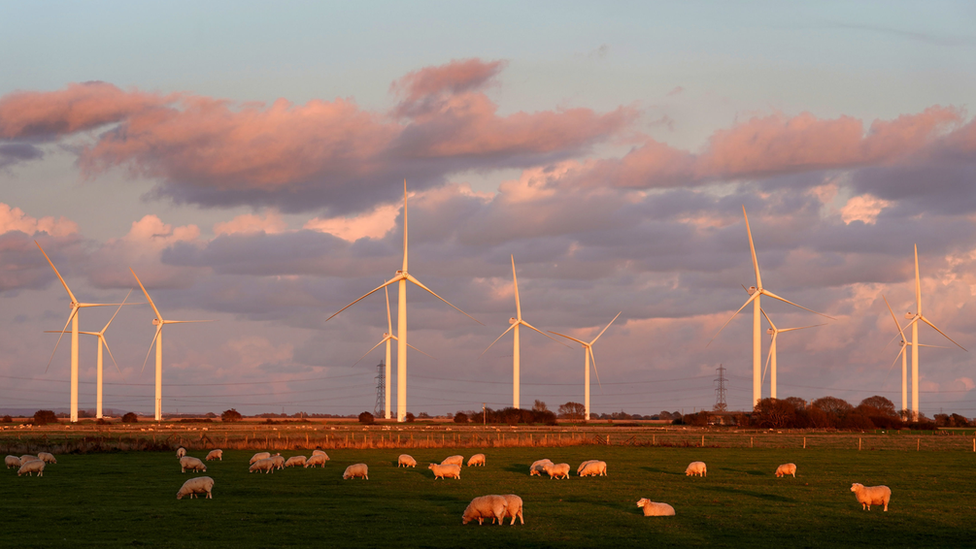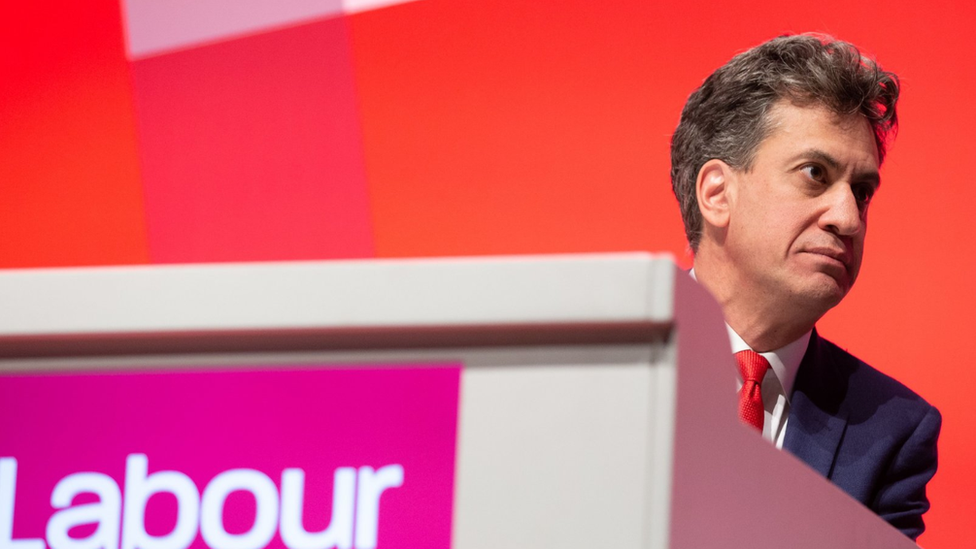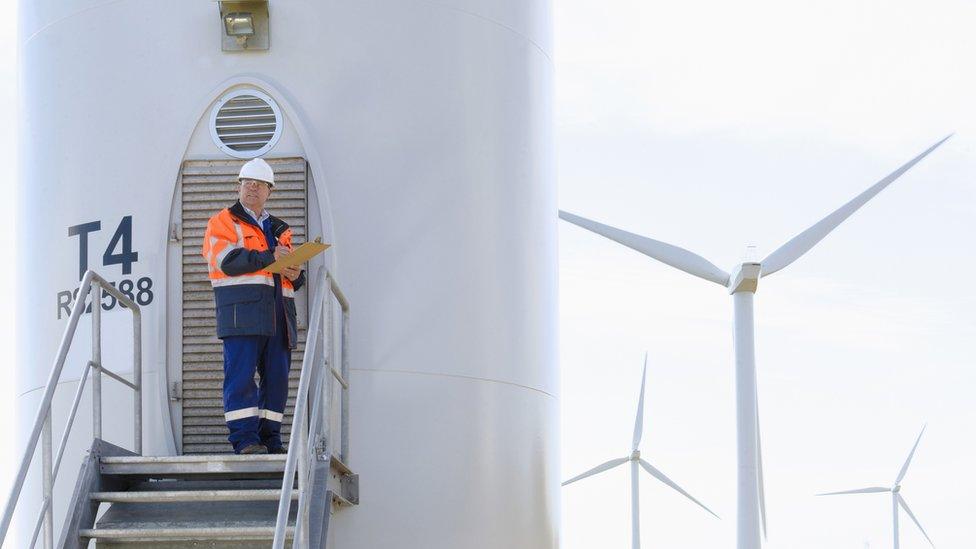Government plans cap on renewable energy revenues
- Published
- comments

Renewable energy generators and nuclear power plants could have their revenues capped under a new government plan.
The move could hit the profits of energy companies, like SSE and Scottish Power, generate from record-high wholesale power prices.
Ministers say the proposal would ensure consumers and businesses pay a fair price for energy.
But energy bosses say the plan - for which there are few details - could put off investors.
Currently in the UK, wholesale electricity prices are set by gas-fired generation.
With the price of gas rocketing in recent months, some nuclear power plants and solar and wind farms have made big profits.
This is different at newer facilities, which produce power at an agreed price.
The temporary cap, which will limit the amount generators can make, is set to be introduced in the House of Commons on Wednesday as part of the Energy Prices Bill.
In its announcement, external, the government gave no details of the expected price limit on revenues generated by renewable energy companies.
The government said it would launch a consultation on how the revenue cap would work before introducing the measure at the start of 2023.
At a committee hearing, Climate Minister Graham Stuart said the cap would "help pay for the cost of other schemes, to reduce customers' energy costs".
When asked how much money the cap scheme would raise for the government, Mr Stuart said he did not have the figures "immediately to hand".
Jonathan Mills, the senior civil servant in charge of energy policy, said "it will be possible to assess the impacts in terms of pounds" once the details of the cap had been finalised.
Renewable energy companies say the UK government's proposed cap on their revenues would effectively amount to a windfall tax, something Prime Minister Liz Truss has said she was opposed to.
A windfall tax on the UK oil and gas sector was introduced on 26 May, described as a 25% Energy Profits Levy, applying to companies that extract British fossil fuels.
Unlike traditional windfall taxes, the cap will not be a retrospective tax on excessive profits made by renewable energy companies.
Instead, the cap will in effect limit the amount of money these energy companies will make, but the details have not yet been revealed.


The government insists it's not imposing a windfall tax, Labour argues it's doing just that.
It's a debate that's unlikely to be settled. But the bigger picture is another huge government intervention in the energy market.
Ministers say the link between soaring gas prices, and renewable and nuclear energy must be broken.
That's why they're capping the price of older low-carbon electricity production with what they say will be a temporary limit on company revenues.
We're yet to see the detail of the plan - but Labour already claim that the government will rake in any excess money companies earn from sales over the imposed cap.
The war in Ukraine means there are exceptional circumstances affecting the supply and price of energy.
Even so, this policy could be a hard sell for a prime minister who wants lower taxes, a smaller state and less regulation wherever possible.

Shadow energy secretary Ed Miliband welcomed the decision to introduce the cap, but said the government was "essentially doing a windfall tax" after Labour had called for it months earlier.
But Business Secretary Jacob Rees-Mogg insisted the move did not amount to a windfall tax on the firms involved.
"It's nothing to do with the profits these companies are making," he told the BBC. "It's to do with the pricing structure agreed with the renewable countries to ensure a good, long-term approach."
The UK's move follows similar efforts in Europe, where the European Union has proposed setting a price limit of 180 euros (£158; $175) per megawatt hour (MWh) on the revenue renewables generators get for selling their power in the market.
The revenue cap is expected to raise more than 117 billion euros, which will be collected by member state governments and used to reduce consumer bills this winter.
Reports by the Financial Times suggest prices of about £50 to £60 per megawatt hour have been mentioned as a starting point for the UK cap, but no final decisions have been taken.
It is expected the legislation could come into force in England and Wales at the start of next year, while the government is consulting with the Scottish government to see if it can extend there.
The legislation would also allow the rules to come into force in Northern Ireland.

Labour said Liz Truss's government had been "dragged kicking and screaming" to make the change
Leaders in the energy sector warned any new measure must not put off investment and should be comparable to other countries.
Dan McGrail, chief executive of RenewableUK, said that the move risks sending the "wrong signal" to investors in renewable energy in the UK, and skewing investment towards fossil fuels.
Keith Anderson, chief executive of Scottish Power, said it was deeply worried at the suggestion renewable generators are making "extraordinary profits".
He said: "It's disappointing that such a significant market intervention by the government has come with so little detail, all this does is create uncertainty.
"This crisis has been caused by the cost of gas and it's strange the proposed solution is to cap the price of low-carbon generation and to leave the gas sector untouched."
The BBC's business editor Simon Jack, who reported the moves at the weekend, explained why the price cap appealed to ministers.
"The problem with a windfall tax is that while it addresses the profit, the price doesn't come down. If you cap the price - then profits, prices and therefore inflation comes down. The latter is a key attraction to the government," he said.
It comes weeks after the government announced a cap which limits household energy bills to 34p per unit of electricity and 10.3p for each unit of gas they use.

WHO WAS MICHAEL X?: Hear the story of Britain’s preeminent Black Power leader
1,000-YEAR-OLD RIDDLES: See how many of these tricky conundrums you can solve

Related topics
- Published8 October 2022
